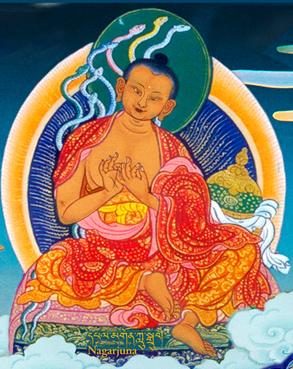Arya Nargarjuna
Mulamadhyamaka-karikas
Fundamentals of the Central Philosophy of Buddhism
 Section 19: An Analysis of Time
Section 19: An Analysis of Time
XIX.1.
If “the present” and “future” exist presupposing “the past,”
“The present” and “future” will exist in “the past.”
XIX.2.
If “the present” and “future” did not exist there in “the past”,
How could “the present” and “future” exist presupposing that “past?
XIX.3.
Without presupposing “the past” the two things “the present” and “future” cannot be proved to exist.
Therefore neither present nor future time exist.
XIX.4.
In this way the remaining two times can be inverted.
Thus one would regard “highest,” “lowest” and “middle,” etc., as oneness and difference. (or “after,” “before” and “middle”, or “right,” “left” and “middle” …)
XIX.5.
A non-stationary “time” cannot be “grasped”; and a stationary “time” which can be grasped does not exist.
How, then, can one perceive time if it is not “grasped”?
XIX.6.
Since time is dependent on a thing (bhava), how can time exist without a thing?
There is not any thing which exists; how, then, will time become something?
Source: Orientalia





